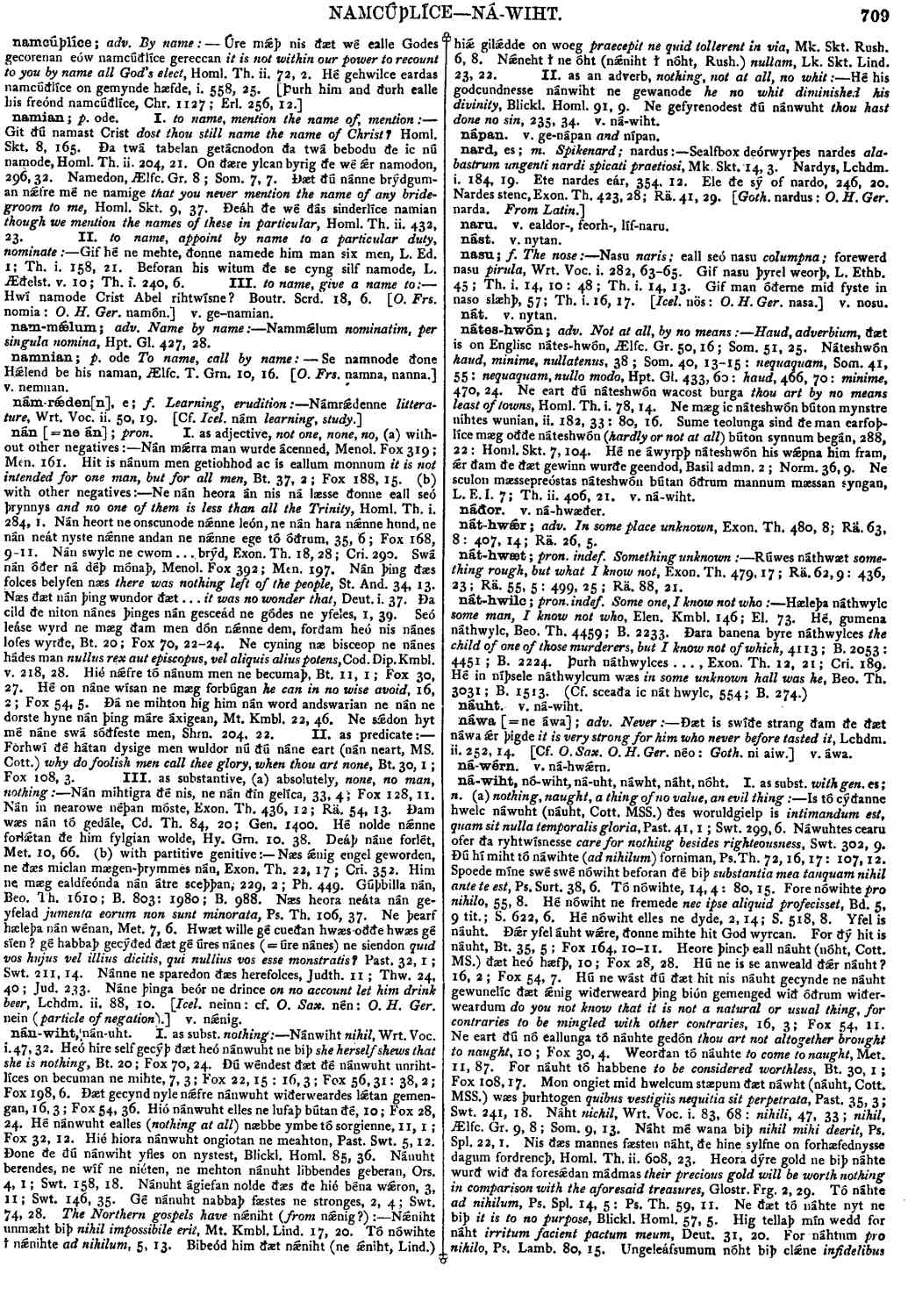ná-wiht
- noun [ neuter ]
-
Is tó cýðanne hwelc náwuht (náuht, Cott. MSS.) ðes woruldgielp is
intimandum est, quam sit nulla temporalis gloria,
- Past. 41,1 ;
- Swt. 299, 6.
-
Náwuhtes cearu ofer ða ryhtwísnesse
care for nothing besides righteousness,
- Swt. 302, 9.
-
Ðú hí miht tó náwihte (
ad nihilum
)forniman,
- Ps.Th. 72, 16, 17 : 107,12.
-
Spoede míne swé swé nówiht beforan ðé biþ
substantia mea tanquam nihil ante te est,
- Ps. Surt. 38, 6.
-
Tó nówihte,
- 14, 4 : 80, 15.
-
Fore nówihte
pro nihilo,
- 55, 8.
-
Hé nówiht ne fremede
nec ipse aliquid profecisset,
- Bd. 5, 9 tit. ;
- S. 622, 6.
-
Hé nówiht elles ne dyde,
- 2, 14 ;
- S. 518, 8.
-
Yfel is náuht. Ðǽr yfel áuht wǽre, ðonne mihte hit God wyrcan. For ðý hit is náuht,
- Bt. 35, 5 ;
- Fox 164, 10-11.
-
Heore þincþ eall náuht (nóht, Cott. MS.) ðæt heó hæfþ,
- 10 ;
- Fox 28, 28.
-
Hú ne is se anweald ðǽr náuht?
- 16, 2 ;
- Fox 54, 7.
-
Hú ne wást ðú ðæt hit nis náuht gecynde ne náuht gewunelíc ðæt ǽnig wiðerweard þing bión gemenged wið óðrum wiðerweardum
do you not know that it is not a natural or usual thing, for contraries to be mingled with other contraries,
- 16, 3 ;
- Fox 54, 11.
-
Ne eart ðú nó eallunga tó náuhte gedón
thou art not altogether brought to naught,
- 10 ;
- Fox 30, 4.
-
Weorðan tó náuhte
to come to naught,
- Met. 11, 87.
-
For náuht tó habbene
to be considered worthless,
- Bt. 30, 1 ;
- Fox 108, 17.
-
Mon ongiet mid hwelcum stæpum ðæt náwht (náuht, Cott. MSS.) wæs þurhtogen
quibus vestigiis nequitia sit perpetrata,
- Past. 35, 3 ;
- Swt. 241, 18.
-
Náht
nichil,
- Wrt. Voc. i. 83, 68:
nihili,
- 47, 33;
nihil,
- Ælfc. Gr. 9, 8 ; Som. 9, 13.
-
Náht mé wana biþ
nihil mihi deerit,
- Ps. Spl. 22, 1.
-
Nis ðæs mannes fæsten náht, ðe hine, sylfne on forhæfednysse dagum fordrencþ,
- Homl. Th. ii. 608, 23.
-
Heora dýre gold ne biþ náhte wurð wið ða foresǽdan mádmas
their precious gold will be worth nothing in comparison with the aforesaid treasures,
- Glostr. Frg. 2, 29.
-
Tó náhte
ad nihilum,
- Ps. Spl. 14, 5 : Ps. Th. 59, 11.
-
Ne ðæt tó náhte nyt ne biþ
it is to no purpose,
- Blickl. Homl. 57, 5.
-
Hig tellaþ mín wedd for náht
irritum facient pactum meum,
- Deut. 31, 20.
-
For náhtum
pro nihilo,
- Ps. Lamb. 80, 15.
-
Ungeleáfsumum nóht biþ clǽne
infidelibus nihil est mundum,
- Bd. 1, 27 ;
- S. 494, 40.
-
Mon nóhtes wyrþe his sáule ne déþ ne his goldes ne his seolfres
a man does not make his soul worthy of anything, of his gold or of his silver,
- Blickl. Homl. 195, 5.
-
Næfdon heó nóht on hire, búton ðæt án ðæt heó hæfde mennisce onlícnesse,
- 147, 15.
-
Ne fqrstent hit him nóht, ne him nóhte ðon má ne beóþ forlǽtna his ágna synna,
- Past. 21 ;
- Swt. 163, 19.
-
¶ genitive used as predicate :--
Ða sǽlþa ðe hé ǽr wénde ðæt gesǽlþa beón sceoldan, náuhtas nǽran
(were worthless
),- Bt. 10. tit. ;
- Fox xii. 6.
-
Eówer godas ne synd náhtes,
- Homl. Skt. 7, 205.
-
Eallinga náwiht mægenes hæfeþ seó ǽfæstnys
nihil omnino virtutis habet religio illa,
- Bd. 2, 13 ;
- S. 516, 3.
-
Ic ðæs nówiht wát,
- Exon. Th. 393, 5 ;
- Rä, 12, 5.
-
Ealles náuht
nothing at all,
- Bt. 36, 6 ;
- Fox 182, 8.
-
Náuht elles
nothing else,
- 3, 2 ;
- Fox 6, 11.
-
Hé ne mæg útane náuht ágnes habban,
- 27, 2 ;
- Fox 98, 8.
-
Ðes náht yfeles ne dyde
hic nihil mali gessit,
- Lk. Skt. 23, 41.
-
Náht elles búton
nothing but,
- Blickl. Homl. 215, 3.
-
Nóht elles ne wunaþ, búton ðæt án,
- 101, 4.
-
Gif wé yfles nóht gedón habbaþ,
- Exon. Th. 262, 8 ;
- Jul. 329.
-
Hit gelamp neáht micelre tíde æfter his slæge (
non multo exacto tempore
),- Bd. 3, 9 ;
- S. 533. 30.
-
Náht feor eást,
- 2, 13 ;
- S. 517, 15 : Blickl. Homl. 43, 26.
-
Mannum ðe náht swíðe God ne lufiaþ,
- 53. 18: Wrt. Voc. ii. 55, 27.
-
Ic wát ðæt ðú náht (áuht,
Cott. MSS.)ne forsláwodest,
- Bt. 10 ;
- Fox 28, 15.
-
Heó nóht lata ne wæs,
- Blicki. Homl. 163, 8.
-
Ne þurfan gé nóht besorgian hwæt gé sprecan,
- 171, 18.
-
Ne wæs hé nóht feor on oferhygd áhafen,
- 215, 32.
-
Nóht longe ofer ðis,
- Exon. Th. 172, 15 ;
- Gú. 1144.
-
Æfter nóht langre tíde,
- Bd. 5, 11 ;
- S. 626, 10.
-
Ic nóht ðon ǽr ðære ærninge blon,
- 5, 6 ;
- S. 619, 15.
Bosworth, Joseph. “ná-wiht.” In An Anglo-Saxon Dictionary Online, edited by Thomas Northcote Toller, Christ Sean, and Ondřej Tichy. Prague: Faculty of Arts, Charles University, 2014. https://bosworthtoller.com/23449.
Checked: 1